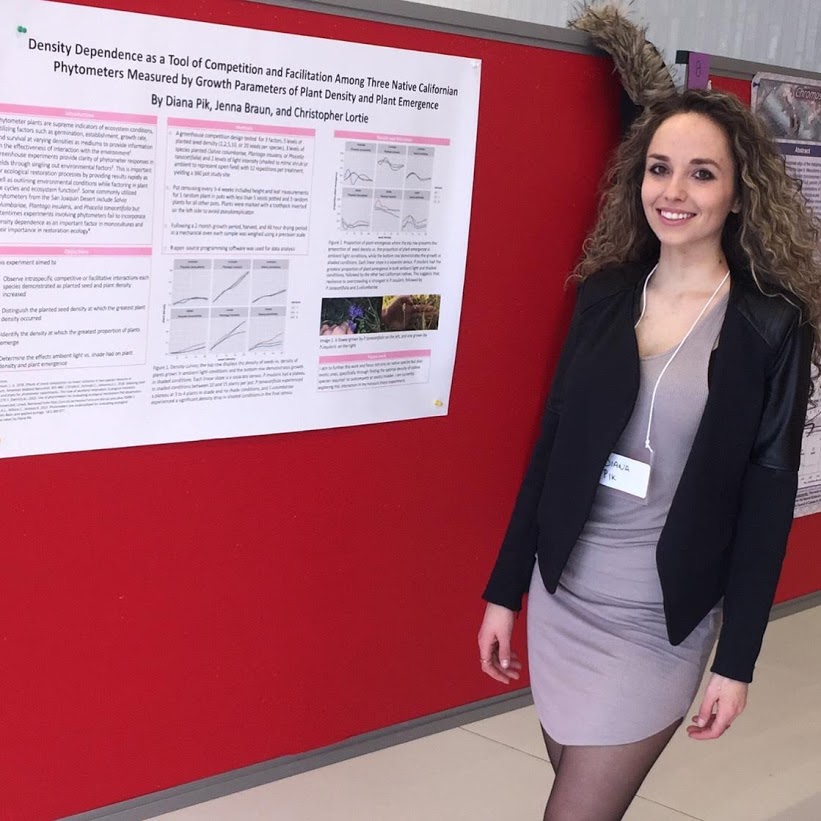I did it! I wrote and defended my Honours Biology Thesis. After a year of conducting literature reviews, planning my experimental design, running my experiment, laboratory procedures to analyze my samples, and learning SPSS to analyze my stats, I composed a thesis encompassing all of my work. This past year, I learned a lot from my research. Here are the top 5 things that this thesis taught me:
- Figure out your research question
This might seem really common sense, but knowing what you are attempting to discover or research is substantially more difficult than it seems. My thesis was on restoring native plants in the Californian deserts which are invaded by an exotic species. So initially I wondered “how do I save these natives from this invasive?”. This question is too broad. You need to pinpoint what it is exactly you are looking for – in other words, what is the relationship you aim to examine? Ultimately, my thesis question ended up examining if there are certain densities of these natives that can outcompete the exotic species by suppressing its competitive capacity. This was the primary question. Whether the natives can suppress the exotic, done, period. There will be other factors, other relationships to note, but first and foremost you need to determine your main inquiry and report these findings.
2. Know the difference between complicated and complex
Writing a thesis or conducting research is not easy. It is a long and strenuous process. Every single part of my experiment was based on the multitude of papers I read during my literature review, from the size of the pots I was using to the number of seeds I used per cm². This work is not easy, but it’s not complicated. Complicated suggests that this topic cannot be understood or explained to other people outside of this field. Complex means that there are many components, but ultimately it can be described to someone outside of your field (sharing knowledge among fields is always fantastic).
3. Set yourself time budgets
Writing takes time. Research takes time. Make sure that you are on top of your work. It might seem like you suddenly have a lot of time before the due date, but this is the time you take to conduct more literature reviews, analyze your stats, and start writing. Editing can take you weeks. This is not a high school lab report, you can’t do this the night before it’s due. You may think you are done and when the edits come back, you might have to rewrite large amounts of your report. Make sure to stay on track with your time budgets. Give yourself reasonable amounts of time to finish tasks.
4. Confidence brings success
Going to your defense is a high-stress situation. You need to be able to present your work and answer inquiries on it. It is at this moment that it is most important for you to bring self-confidence. Your stance, intonation, body language, and facial expression all show whether you are confident in not only yourself but in your work. It took me a long time to get to the level of self-confidence and self-fulfillment of where I am now, but it is essential to work on valuing yourself and your abilities so that it shows when you speak. If you believe in yourself, it makes it easier for others to also believe in you.
5. Know that your thesis and academic success is not your entire worth
It can be absolutely nerve-wracking writing a thesis, and when things go wrong (which sometimes they do!) it can be challenging to continue, persevere, and believe in yourself. It is exceptionally easy to feel like your GPA or the research you conduct describes how successful of a person you are, and let me tell you this is not the case. Some of the most well-read and knowledgable individuals do not see their families, do not contribute to their communities, and spend their lives isolated. To me, this is not success. Success to me is developing self-fulfillment from the vast array of relationships we have in our everyday lives along with assisting others with their journies. While writing my thesis I had immense help from every single person in my lab, from my supervisor, from my partner, from my friends, and from my family. I had people help me with my thesis in ways that would not benefit them but made my thesis so much better. I was supported along the way, and without these people, I would not have been able to write this thesis. You are not alone and can get help from others during your research. The academic community is filled with extraordinary individuals and reaching out for help is not embarrassing or shameful. At the end of the day, it is important to remember that if things aren’t going well, you can consult with others, rework your ideas, or take a breather but to not give up. The people who succeed are not people who never fail, they are people who have failed hundreds of times but kept going despite the roadblocks.
